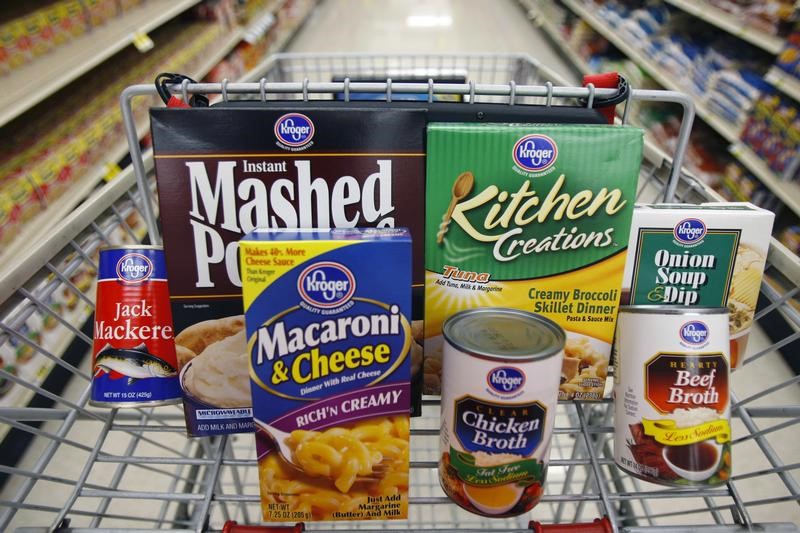Robinhood shares gain on Q2 beat, as user and crypto growth accelerate
(Bloomberg) -- Supermarket prices are rising, and restaurants are reopening. But Americans keep stocking up on groceries.
Grocery sales accelerated in late May and early June, according to Nielsen data cited in a Morgan Stanley (NYSE:MS) note. That’s despite restaurant revenue growth turning positive in April for the first time during the pandemic. Meanwhile, supermarket prices are up 15% on average versus before Covid-19. More than a third of Americans said they’re still buying more groceries in the first quarter of the year, with only 8% saying they’re purchasing less, according to a survey from researcher Jungle Scout.
The situation has confounded analysts, who expected robust grocery-store sales to diminish as the year progressed and as vaccinated Americans returned to offices, restaurants and travel. It can’t be explained by inflation, because grocers are also returning to their normal practice of discounting, which partially offsets the price hikes they’re taking elsewhere. Sales of groceries on a unit level, which exclude the effects of inflation, have held steady.
“This is surprising given the economy reopening,” Simeon Gutman, an analyst at Morgan Stanley, said in the note. “And, we think, to the market as well, which has bid grocer stocks up.”
Kroger (NYSE:KR) Co. is the latest beneficiary of the trend, as the company boosted its full-year sales and profit forecasts on June 17 thanks to better-than-expected revenue in the first quarter. The beat and raise sent its shares up the most in almost five months. Walmart (NYSE:WMT) Inc., the nation’s biggest grocer, and Target Corp. (NYSE:TGT) have also enjoyed brisk food sales this year.
Two-thirds of people said they’re buying the same number of grocery items weekly as they did during the height of the pandemic, according to a survey conducted this week by market researcher CivicScience for Bloomberg News.
“People still continue to eat at home more than pre-Covid,” Kroger Chief Executive Officer Rodney McMullen said on a call with analysts. In a survey Kroger conducted of its customers, 92% said they enjoy cooking the same or more than they did before the pandemic. “They still continue to cook more than pre-Covid, and they’re buying more premium products.”
Online Options
One reason for the sustained lift in grocery sales is that online ordering has made it easier for shoppers to buy more, with curbside pickup and home delivery removing the hassle of lugging items through the store and checkout. Around one quarter of adults said they do all or most of their food shopping via e-commerce, up from 14% last year, according to Coresight Research.
Another catalyst for food sales is a greater sense of preparedness instilled by last year’s lockdowns, when many essential items were hard to find. Keeping pantries more fully stocked than normal reflects “some underlying caution and perhaps some ingrained habits from prolonged stay-at-home behaviors,” Gutman said.
It might not last, though, as the reopening continues to expand. New York and California just lifted most of their Covid-19 restrictions last week, so much of the pent-up demand for spending in restaurants and other places outside the home is yet to emerge.
Households also have plenty of essential items left in their cupboards. The most stockpiled items that U.S. adults are still working through are paper products like toilet paper or paper towels, a survey conducted last month by Morning Consult for Bloomberg News shows. More than a quarter of Americans said they stocked up on canned soups and dried foods at the start of the pandemic and still have some left.
“As we move into the coming months, you will see a gradual improvement in travel and leisure spending, and that will come at the expense of the food retailers,” Brian Yarbrough, an analyst at Edward Jones, said by phone. “If you’re starting to eat out more, and you’re still buying five bags of rice, at some point you don’t have room for it.”
©2021 Bloomberg L.P.
